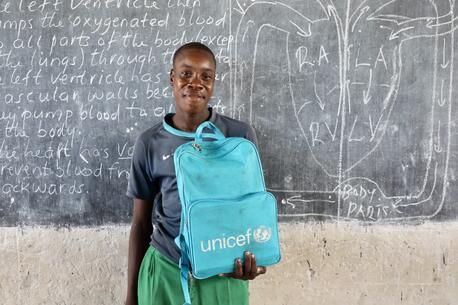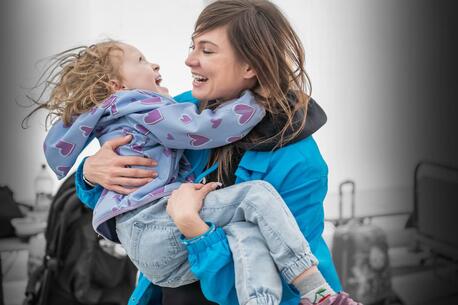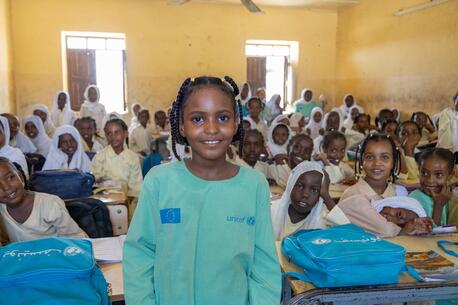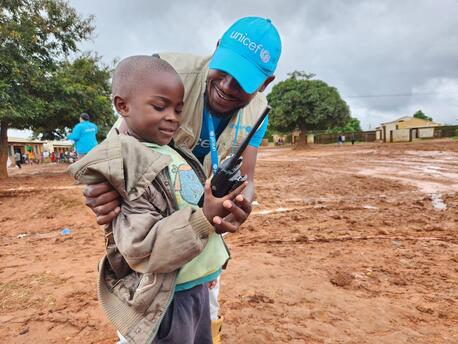
Beyond the Numbers: UNICEF's Humanitarian Action in 2023
From violent conflicts to health and climate emergencies to natural disasters, UNICEF was there.
412 crises in 107 countries
UNICEF recently reported out the results of all humanitarian action taken in 2023 — results that were achieved alongside partners in the course of responding to 412 new or ongoing humanitarian crises in 107 countries, sometimes in very challenging operating environments.
The crises ranged from violent conflicts to health and climate emergencies to natural disasters. In some cases, it was a mix of some or all of the above. Several received media attention. Many did not.
UNICEF strives to respond equitably, leveraging its many partnerships — 1,902 of them, to be exact — and vast global footprint. Flexible funding — contributions not tied to any specific cause or country — plays a crucial role.
"We delivered vaccines in conflict zones. We delivered safe drinking water and sanitation facilities during natural disasters. But most importantly we created safe spaces for children where they need it the most," Lucia Elmi, UNICEF's Director of Emergency Operations, said in a video message to supporters.
"Thanks to your support, we could respond swiftly, sometimes in a matter of hours, to the most urgent needs — while at the same time laying the foundation for longer term recovery," Elmi said. "Of course we don't stop with immediate relief; we provide long-term support to shore up systems, to strengthen resilience and ensure better protection for children, no matter the circumstances."
Every dollar invested creates that lasting change, added Carla Haddad Mardini, UNICEF's Global Director for Private Fundraising and Partnerships.
The impact numbers are massive: Almost 120 million children checked and/or treated for malnutrition. Over 40 million people reached with safe water and sanitation. Over 30 million children vaccinated against measles.
And almost 20 million children and adolescents were able to access education, with UNICEF's help, including early learning. (For more results, see our summary of the 2023 Global Results Report.)
Behind these numbers are real children and families — people with urgent needs in places where crisis conditions are chronic and the response is ongoing — and in many cases, outside news headlines.
The Democratic Republic of the Congo (DRC) is one of those places. UNICEF's humanitarian action in the country in 2023 is a case study in the cross-cutting nature of UNICEF's programming.
UNICEF's impact for children in the DRC
First, a recap of what was happening there. Escalating armed conflict, particularly in the eastern part of the country, displaced 7 million people in 2023. The number of grave violations against children surged, increasing in the first half of 2023 by 41 percent. Staggering levels of gender-based violence against displaced women and girls were reported in Goma, the capital city.
While conditions deteriorated heavily in the east, Mai Ndombe Province, on the country’s western border, also experienced inter-communal conflicts resulting in violence, displacement and loss of life, exacerbating the humanitarian crisis and impeding development efforts. And — partly driven by this instability and upheaval — the DRC faced its worst cholera outbreak in six years. A measles outbreak affected more than 314,000 children, causing nearly 5,900 deaths.
Climate change is another factor. The DRC suffers from flooding and landslides, which, coupled with inadequate infrastructure, further restrict children’s access to clean water, good sanitation and quality education and health services, UNICEF's 2023 results report notes.
Flexible funding enabled UNICEF to ramp up and adjust its humanitarian response in the DRC as needs intensified — bringing in critical medical supplies, improving WASH services and mitigating protection risks, among other interventions.
UNICEF's response to the DRC's measles outbreak, for example, included conducting mass vaccination campaigns while also addressing risk factors like malnutrition, barriers to seeking treatment and gaps in the surveillance and reporting system, according to the results report.
Tremendous efforts were also made to help out-of-school children resume their education.
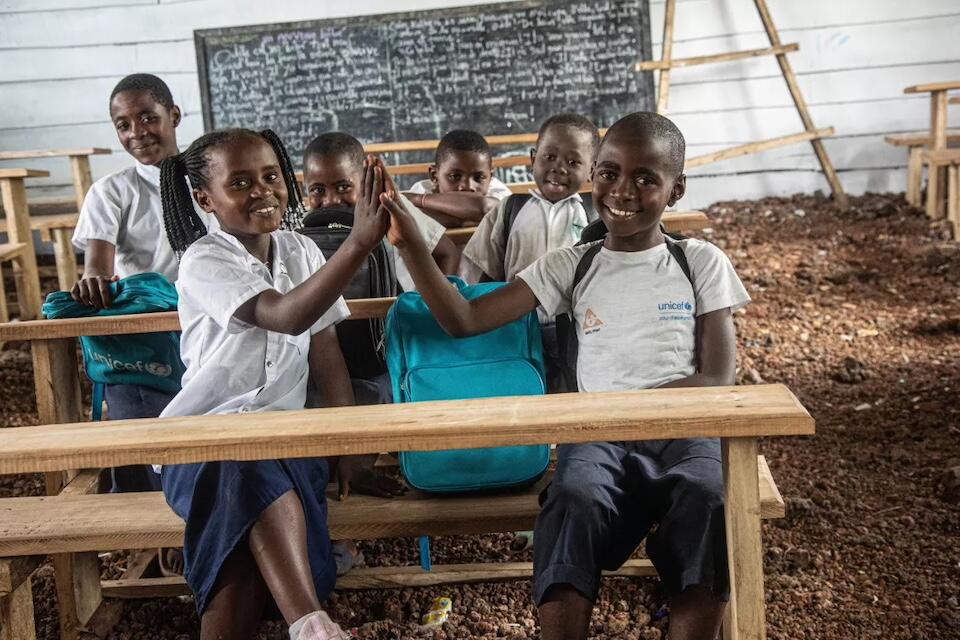
Emergency classrooms enable children affected by conflict in eastern DRC to resume their studies and prepare for the future
Armed conflict in eastern DRC has forced thousands of families to abandon their homes in search of safety. When they arrive at their new location, families are eager to send their children to school. But often there is just not enough classroom space to accommodate everyone — displaced children and children from host communities alike.
This is what happened to 9-year-old Hélène. After escaping from the village of Rugari in Rutshuru, North Kivu province, she and her family took refuge in the Bujari Primary School compound just outside Goma.
Although she was living in a school, she was unable to attend classes.
"There was no place for me," she says. "I could play with the other children during their breaks but I couldn't attend lessons with them afterwards.”
For a long time, Hélène harbored one wish: to return to school as soon as possible.
As part of the humanitarian action plan in the country, UNICEF and partners are addressing school capacity issues by setting up temporary learning spaces to accommodate students. Spending time in a classroom also helps mitigate a child's risks of early marriage, sexual abuse and economic exploitation that come with being out of school.
Three temporary learning spaces were constructed within the Bujari compound. The classrooms were built in just a few weeks with the help of local communities, using wood and other readily available materials. The new spaces have allowed several dozen more pupils to enroll — including Hélène.
"My dream is to become an engineer and build schools so that, like me, every child has access to education," Hélène says.
The temporary classes allow not only enable displaced children to resume their studies, but also the children of families living close to the Bujari site. In addition to their academic studies, pupils are also learning new social skills, such as meeting and getting along with others from outside their community.
Ten-year-olds Adili and Amuli, for example, are from different villages. "We’ve become best friends because we both work hard to be the best in our class," explains Adili, who always sits next to her new friend.
As well as constructing temporary learning spaces, UNICEF also provides children with school supplies and teachers with learning and recreational materials. Backpacks, pens and notebooks are often things that children aren’t able to bring with them when they leave their homes.
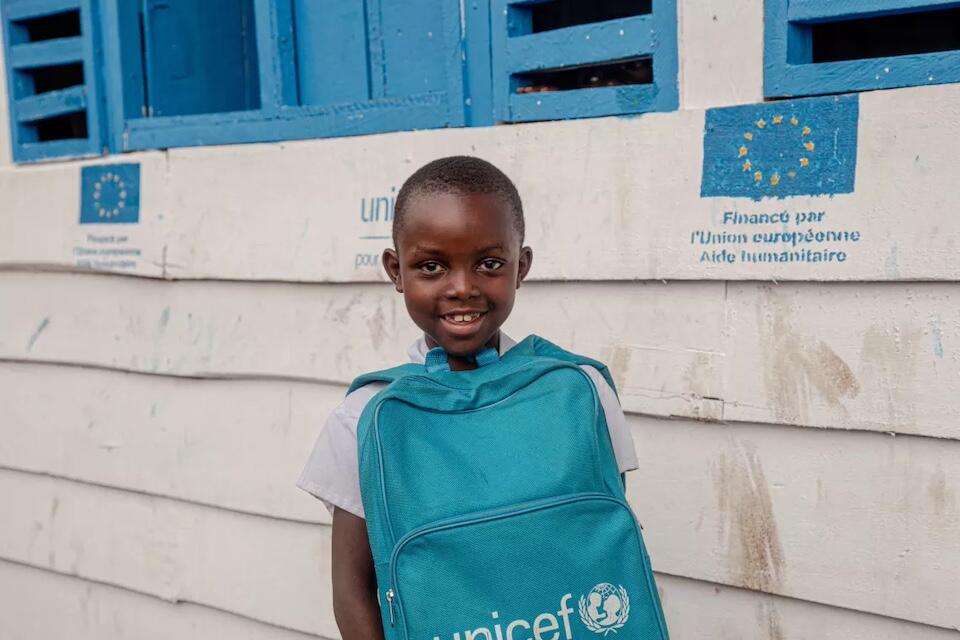
"I'm happy to be going to school,” says 7-year-old Merveille, proudly holding her new school bag. “When I'm older, I'll be a teacher, teaching other children to read and write."
Education interventions are closely linked to child protection and overall well-being. The school day routine helps give children a sense of normalcy amid violence and instability. Being in school often helps connect children to other services and support. UNICEF works with teachers in eastern DRC (and elsewhere) to train them in child protection issues and in the provision of psychosocial support.
Find more examples of UNICEF's humanitarian response efforts and how they intersect to make a difference in children's lives in UNICEF's Humanitarian Action: Global Results Report 2023.
Help UNICEF deliver impact for children. Donate monthly.
A section of this article is based on a story originally published by UNICEF DRC.
HOW TO HELP
There are many ways to make a difference
War, famine, poverty, natural disasters — threats to the world's children keep coming. But UNICEF won't stop working to keep children healthy and safe.
UNICEF works in over 190 countries and territories — more places than any other children's organization. UNICEF has the world's largest humanitarian warehouse and, when disaster strikes, can get supplies almost anywhere within 72 hours. Constantly innovating, always advocating for a better world for children, UNICEF works to ensure that every child can grow up healthy, educated, protected and respected.
Would you like to help give all children the opportunity to reach their full potential? There are many ways to get involved.



